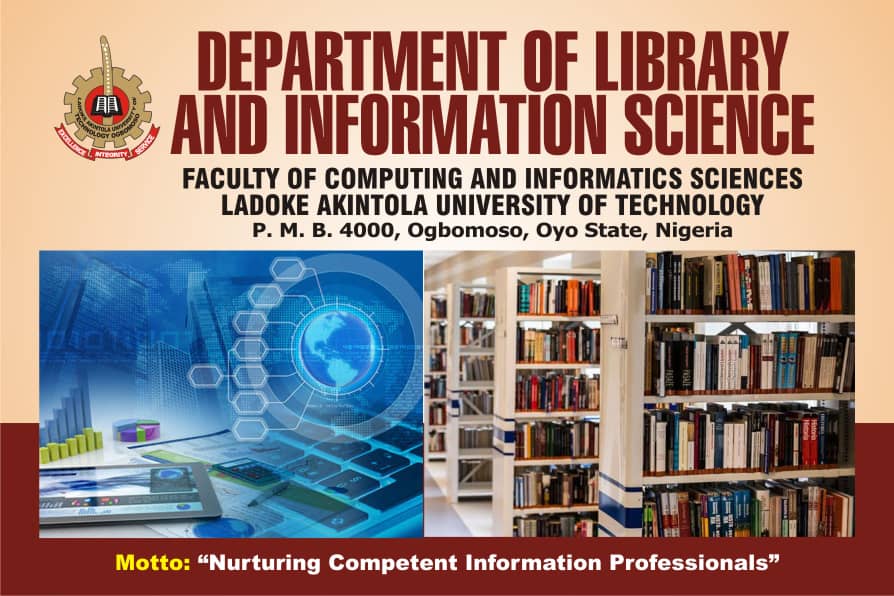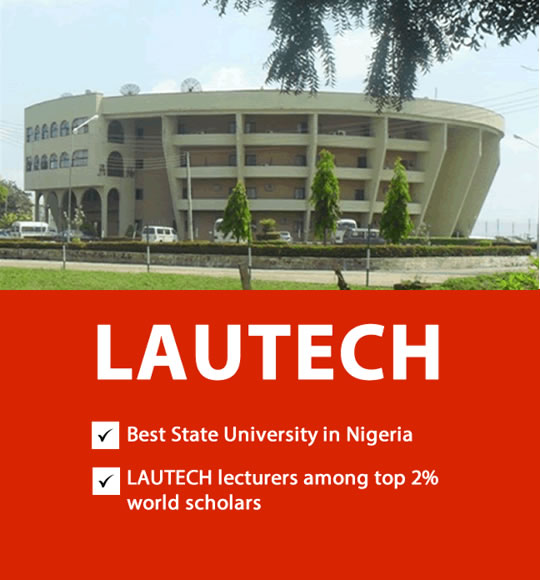
The Department offers courses leading to the award of B.LIS in Library and Information Science. The duration of the programme is a minimum of four (4) years for a Unified Tertiary Matriculation Examination (UTME) candidate, three (3) years for a Direct Entry (200 level).
Admission Requirements
Admission into 100 Level for Library and Information Science (LIS) programme are as listed below:
UTME Students (4 –year degree programme)
The admission requirements for entry into the first degree programme are the same as the University entry requirements which is through the Unified Tertiary Matriculation Examination (UTME). Credit passes in the Senior Secondary Certificate Examination (SSCE) or its equivalent in five (5) subjects: English language, Mathematics, and any other three (3) Arts or Social Science subjects in not more than two sittings. In addition, candidates must satisfy the University’s general entry requirements.
UTME SUBJECTS: English language, Mathematics and any two from the list of ‘O’ level subjects.
Direct Entry (3 –year degree programme)
a. i. Any one of the following qualifications is admissible into 200 Level:
A pass at Merit level in Diploma in Library & Information Science or Computer Science (provided the University’s requirements have been satisfied).
b. i. Two (2) passes in relevant subject areas at Advanced Level with SSCE/General Certificate Examination (GCE) ‘O’ level credit passes in three (3) other subjects in not more than two (2) sittings, or
ii. Three (3) passes in relevant subjects at Advanced Level with SSCE/GCE ‘O’ level credit passes in two (2) other subjects in not more than two (2) sittings.
c. i. At least Merit in two (2) major subjects in relevant areas in the Nigeria Certificate in Education (NCE) with SSCE/GCE ‘O’ level credit passes or its equivalent in three (3) other subjects.
ii. Two (2) passes at the Interim Joint Matriculation Board (IJMB) examination or of Basic Studies Terminal Examinations in (International Baccalaureate) from recognized institution with SSCE credit passes or its equivalent in three (3) other subjects
iii.Three (3) passes in c (ii) above with a Senior Secondary Certificate Examination credit or its equivalent in two (2) other subjects.
English Language and Mathematics Requirements
In all cases, whether by Direct Entry or Post UTME, the following shall apply:
A credit in English Language and Mathematics at the Secondary Certificate level or its equivalent are required by students based upon the NUC Benchmark Minimum Academic Standards for undergraduate programmes in Nigerian Universities (2007).
Transfer to the Programme (Intra/Inter University)
Apart from meeting all the conditions for general admission into the University, the School and the Department, any student (candidate) on Intra/inter-University transfer must have successfully passed the mandatory departmental courses as stipulated in the curriculum (and students hand book) in the level to which transfer is sought. The minimum Cumulative Grade Point Average (CGPA) for accepting a student into LIS department is 2.0. Finally, all candidates (students) desiring to take matriculation oath must have been certified to be worthy in character.

